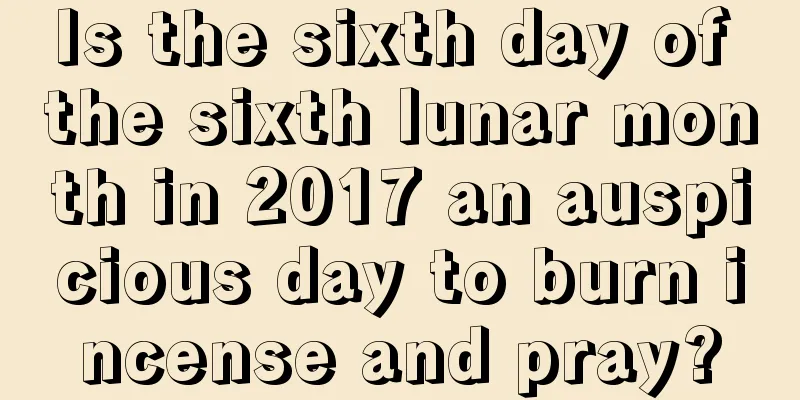What is the day of the Little New Year in the South on the 24th day of the twelfth lunar month in 2020? The meaning of Little New Year

Introduction: Every day of the year unfolds differently, so [What is the day of the Southern Xiaonian on the 24th day of the twelfth lunar month in 2020 and what is the meaning of Xiaonian] follow the editor to learn about it. The twelfth month is the end of the year and it is the coldest time of winter. People quicken their pace towards the Spring Festival with joy and eagerness. Let’s follow Mr. Shui Mo to predict the good and bad luck of the twelfth lunar month of 2020.What will the 24th day of the twelfth lunar month of 2020 be like in the south?Lunar calendar: December 24, 2020 Gregorian calendar: February 5, 2021, Friday, Aquarius [Today's Old Almanac is suitable] Breaking ground, drilling, repairing graves, burying, fasting and offering sacrifices, seeking offspring, seeking wealth, accepting marriage proposals, taking office, getting married, building, breaking ground, accepting wealth, erecting pillars, planting, resolving lawsuits, opening the market, establishing vouchers, building houses, catching fish [Today's Old Almanac is unsuitable] Setting up beds, felling trees, raising beams, accepting livestock, clearing meridians, seeking medical treatment , moving to new homes, setting up incense, and sailing——Since "moving into the new house" is not in the lunar calendar and does not constitute an auspicious day requirement, the 24th day of the twelfth lunar month in 2020, which is the Little New Year in the South, is not an auspicious day. The meaning of XiaonianXiaonian does not refer to a specific day. Due to local customs, the days called "Xiaonian" are also different. The main folk activities during the Little New Year include sweeping the house and offering sacrifices to the kitchen god. The traditional folk festival of the Little New Year (the day for cleaning the house and worshiping the kitchen god) is on the 24th day of the twelfth lunar month. In most parts of the south, the ancient tradition of celebrating the Little New Year on the 24th day of the twelfth lunar month is still maintained. Starting from the middle and late Qing Dynasty, the imperial family held a ceremony to worship the heaven on the 23rd day of the twelfth lunar month. In order to "save money", they also worshipped the Kitchen God. Therefore, the people in the northern region followed suit and celebrated the Little New Year one day earlier on the 23rd day of the twelfth lunar month. The concept and date of "Little New Year" vary from place to place. In the north it is the 23rd day of the twelfth lunar month, in most parts of the south it is the 24th day of the twelfth lunar month, in Jiangsu, Zhejiang and Shanghai regions both "the 24th day of the twelfth lunar month" and "the night before New Year's Eve" are called Little New Year, in Nanjing area the Lantern Festival on the 15th day of the first lunar month is called Little New Year, in some parts of Yunnan the date of Little New Year is the 16th day of the first lunar month, and in some parts of the southwest and north the date of Little New Year is New Year's Eve.Historical Origin of XiaonianThe Little New Year is usually regarded as the beginning of the busy year, which means that people begin to prepare New Year's goods, sweep the house, worship the kitchen god, etc., preparing to have a good new year in a clean manner. It expresses people's good wishes to bid farewell to the old and usher in the new, and to welcome good luck and fortune. Due to different customs in different places, the day called "Little New Year" is also different. In modern times, it has been circulated in some places in my country that the New Year's Eve for officials is on the 23rd of the twelfth lunar month, for common people it is on the 24th, and for people living on water it is on the 25th. In fact, the traditional Little New Year is on the 24th day of the twelfth lunar month. Because the emperors in the middle and late Qing Dynasty worshipped the Kitchen God one day in advance on the 23rd day of the twelfth lunar month, the people in the northern region followed suit and also celebrated the Little New Year one day in advance on the 23rd day of the twelfth lunar month. Offering sacrifices to the Kitchen God is one of the main customs of the Little New Year. The folk custom of offering sacrifices to the Kitchen God originated from the ancient custom of worshiping fire. "Shi Ming" (Explanation of Names): "Stove. To create, to create food." The duties of the Kitchen God are to control the stove fire and manage food. Later, this duty was expanded to examine the good and evil in the world and to determine whether blessings or disasters will be bestowed. According to the local customs record "Fengtu Ji" written by Zhou Chu, a famous person in Jin Dynasty in China, "On the night of the 24th day of the twelfth lunar month, people worship the Kitchen God. It is said that the Kitchen God will go to heaven the next day to report the affairs of the year, so they worship him the day before." "Poem of Offering to the Kitchen God" written by Fan Chengda in Song Dynasty reads: "According to ancient legend, on the 24th day of the twelfth lunar month, the Kitchen God looks up to the sky to speak... I send you drunk and full as you ascend to the Heaven's Gate. Don't say anything about whether the ladle is long or short. I will ask for your profits and share them when you return." Before the mid-Qing Dynasty, the day of offering sacrifices to the Kitchen God was always the 24th day of the twelfth lunar month. And at least until the Qianlong period, sacrifices were held on the 24th day of the twelfth lunar month. "Records of Qing Jia" Volume 12 "December: The Fourth Night of Nian, Sending Off the Kitchen God": "Common people call the twenty-fourth night of the twelfth lunar month the fourth night of Nian, and this is the night to send off the Kitchen God." "A Grand View of Qing Dynasty Unofficial History: Remaining Stories of Qing Palaces" says that during the Qianlong period, the Kitchen God was worshipped in the Kunning Palace on the twenty-fourth night of the twelfth lunar month every year. Starting from the middle and late Qing Dynasty, the imperial family held a ceremony to worship the heaven on the 23rd day of the twelfth lunar month. In order to "save money", they also worshipped the Kitchen God. Therefore, following the example of their superiors, people in the northern region also celebrated the New Year's Eve one day in advance on the 23rd day of the twelfth lunar month. In most parts of the south, the ancient tradition of celebrating the Little New Year on the 24th day of the twelfth lunar month is still maintained. |
>>: Is it not suitable to have a haircut on the day before the beginning of spring in 2021?
Recommend
How to use the birth date to name a baby born on the Dragon Boat Festival in 2018?
Introduction: Every child is given a name by his o...
Why do we eat glutinous rice and drink Laba porridge during Xiaohan? Is it cold during the Minor Cold season?
The customs and habits of different festivals and ...
Is it a bad idea to move during the Dragon Boat Festival in 2018?
Chinese people have always had a strong attachment...
What is the zodiac sign of a baby born on the second day of the third lunar month in 2020? What is fate?
People are born with their own zodiac sign, which ...
Recommended auspicious dates for engagement around the 2019 Winter Solstice. Will it get colder after the 2019 Winter Solstice?
Introduction: You also need to choose an auspiciou...
What are the auspicious days in March of the lunar calendar in the Year of the Pig 2019?
Introduction: There are 365 days in a year, and ea...
The lunar calendar for the first day of August in 2019, is this a good day?
There are 365 days in a year, and every day is an...
When is Women's Day in 2019? Is this a good day?
When is Women's Day in 2019? Is this a good da...
Can we get married on the day of the Dragon Raising its Head? What is the process for obtaining a marriage certificate?
February 2nd is the famous Chinese festival Dragon...
Is it unlucky to hold a funeral on the 23rd day of the fourth lunar month in 2020? What are the considerations for choosing a date for a funeral?
Introduction: According to the traditional customs...
Is it a good idea to get married during the Winter Solstice in 2018?
Is it a good idea to get married during the Winter...
Is it okay to pray on the 29th day of the ninth lunar month in 2018?
Is it okay to pray on the 29th day of the ninth lu...
What Feng Shui considerations are needed when choosing a store location so that the business will be prosperous?
Introduction: Now more and more office workers are...
Is August 25th of the lunar calendar in 2022 a suitable date for engagement? How to match the eight characters for marriage?
The eighth month of the lunar calendar is the eigh...
Is September 26, 2022, the Year of the Tiger, suitable for groundbreaking and renovation?
Renovating a house is a tedious task. There are ma...









